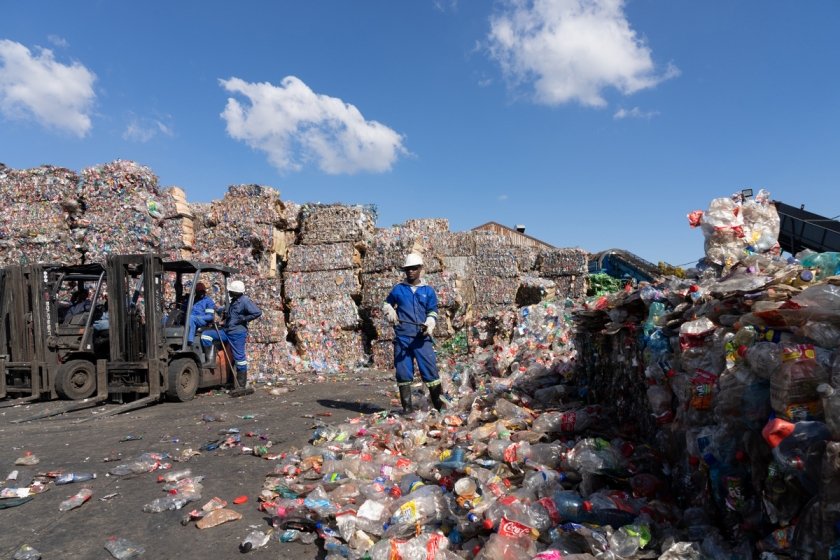The material recycled by waste pickers, the weight, and the price are all recorded by the BanQu App, according to Banda.

Suzan Kubheka Banda, a 44-year-old Johannesburg, South Africa, mother of three, began recycling plastic waste in 2008. In 2010, she established her own buyback centre. She now has 11 employees and 3000 kilogrammes of plastic waste for recycling. She began utilising the real-time data and reporting BanQu App, a blockchain-based traceability app, in 2020.
The material recycled by waste pickers, the weight, and the price are all recorded by the BanQu App, according to Banda. She particularly values the app’s weekly and monthly reports because they let her know how much business the centre has generated and where they can make improvements.
The BanQu app serves as an example of how a company can use digital tools to link informal waste pickers and buyback facilities with significant recycling businesses like PETCO and global producers like Pepsico, WilMar, and Solvay. The bigger companies, however, have access to BanQu’s data to guarantee the transparency and traceability of the materials in their supply chains.
Inger Andersen, executive director of the United Nations Environment Programme (UNEP), and Ashish Gadnis, CEO and co-founder of BanQu, will discuss how the continent’s private sector can help the continent’s efforts to combat plastic pollution at the 2023 Africa CEO Forum.
Previously primarily the domain of local governments, Africa’s private sector is increasingly seeing business opportunities in the recycling sector. Businesses support the public sector in managing plastic waste by advancing infrastructure and driving innovation and market growth. Less than 10% of the more than 400 million tonnes of plastic produced annually worldwide is recycled.
RecyclePoints in Nigeria, PETCO in South Africa, EcoPost in Kenya, and BanQu, which has operations all over the continent, are some of the private sector participants in the recycling sector in Africa.
In order to give informal waste collectors a way to create verifiable records of their collections and earnings, BanQu introduced blockchain-based technology in 2014.
BanQu and its partners have been successful in gathering 30 million kilos of PET, or polyethylene terephthalate, annually through cooperation and partnership. This is because informal waste pickers can now create verifiable records of their earnings and collections thanks to the use of blockchain-based technology, which generates a ledger of transactions.
Both big brands and informal waste collectors gain from the industry’s transparency and traceability provided by the BanQu App. The Extended Producers Responsibility (EPR) scheme, which mandates producers to finance the collection, recycling, and ethical end-of-life disposal of plastic products, is another area in which businesses use the app to monitor compliance.
According to estimates, the informal sector is primarily responsible for urban areas and generates 58% of all plastic waste that is collected and recovered globally.
To help them overcome the obstacles faced by the unbanked and financially excluded populations, BanQu aims to give informal waste pickers a digital identity and financial history. Injecting an additional US$8 billion into the African economy through waste diversion away from dumps and landfills and towards reuse, recycling, and recovery, according to studies, could significantly improve the socioeconomic opportunities on the continent.
The only source of income for Johannesburg waste picker Rebecca Skhosana, 36, is recycling. Owner of a PETCO-sponsored buyback facility Suzan Kubheka Banda demonstrates Rebecca Skhosana’s balance on the BanQu portal in Johannesburg, South Africa.
According to research conducted by UNEP, recycling is not a long-term solution to the problem of plastic pollution in Africa. Recycling by itself, in the opinion of Rose Mwebaza, Director of UNEP’s Africa Office, is not a workable long-term solution.
Turning Off the Tap: How the World Can End Plastic Pollution and Create a Circular Economy, a UNEP report, urges a shift to new business models that put an emphasis on reducing single-use plastic, redesigning products to reduce it, reusing and recycling plastic, and reorienting and diversifying plastic by substituting alternative materials for plastic products. By 2040, this change could save US$4.5 trillion in direct and indirect costs.
The African Circular Economy Alliance was introduced by the governments of South Africa, Nigeria, and Rwanda at the UN Climate Conference in 2017, which was held at the African Development Bank (AfDB). Since signing an MoU in 1989, UNEP and AfDB have been working together on various projects, including the Africa Natural Capital Atlas.
The New Plastics Economy Global Commitment, which unites companies, governments, and other organisations worldwide behind a shared vision of a circular economy for plastic, was introduced in 2018 by UNEP and the Ellen Macarthur Foundation. Governments, companies, and financial institutions are among the over 500 signatories to the commitment, which aims to lessen the scope of the issue through reuse, recycling, and the discovery of plastic substitutes.
An international legally binding treaty on plastic pollution is being negotiated by the Intergovernmental Negotiating Committee (INC), which is hosted by UNEP in conjunction with World Environment Day. The INC is currently engaged in negotiations as a result of the historic resolution to end plastic pollution that was adopted by all 193 UN Member States at the fifth United Nations Environment Assembly in March 2022.